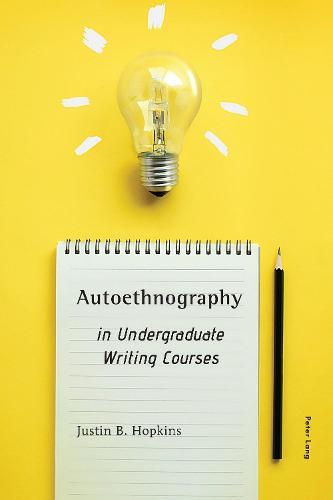Overview
Autoethnography in Undergraduate Writing Courses blends narrative and analysis in an engaging and applicable account of how the genre of autoethnography can be a valuable addition or alternative to traditional research assignments. Many writing teachers struggle to motivate and equip students to conduct meaningful and effective research. Practicing autoethnography—the scholarly combination of personal reflection, artistic representation, and social/cultural research—provides an opportunity for students to research and write about something that genuinely interests them: their own experiences. A genre of personal writing, autoethnography is comparable to pedagogy pioneered by expressivists like Donald Murray, Peter Elbow, and Wendy Bishop, among others. However, combining personal writing with research—as autoethnography does—is more rare. Some compositionists have already used autoethnography in their own research and teaching, but this book demonstrates why more compositionists should consider adopting autoethnography into their pedagogy. The author shares his own experience teaching autoethnography at the undergraduate level, modeling its potential and demonstrating its impact. Written in a lively, conversational voice, the book presents substantial qualitative research, including samples of student writing, supplemented by student interviews and surveys. These data indicate that practicing autoethnography can have unusually, if not uniquely, positive effects on students’ lives. Specifically, the author identifies and illustrates eight outcomes of practicing autoethnography: increased reflexivity, improved research and writing skills, greater awareness of ethical issues, critical empowerment, therapeutic catharsis, enjoyment, and the development of a sense of community.
Full Product Details
Author: Justin B. Hopkins
Publisher: Peter Lang Publishing Inc
Imprint: Peter Lang Publishing Inc
Edition: New edition
Weight: 0.306kg
ISBN: 9781433181436
ISBN 10: 1433181436
Pages: 190
Publication Date: 23 December 2020
Audience:
Professional and scholarly
,
Professional & Vocational
Format: Paperback
Publisher's Status: Active
Availability: Manufactured on demand

We will order this item for you from a manufactured on demand supplier.
Reviews
With a creative and engaging narrative of his own, Justin Hopkins tempts composition instructors to adopt autoethnography to enhance the writing and learning of their students. Interspersing actual drafts from students, he lucidly demonstrates how student research, composing, voice, and ideologies can be addressed transformatively by teachers. He makes a compelling case for the rhetorical and intellectual value of this genre, wiping out any lingering doubts on the academic relevance of the personal and narrative. -Suresh Canagarajah, Professor, Pennsylvania State University Autoethnographic writing gives composition students voice and power, helping them critically engage and communicate the narrative of the self. Hopkins powerfully models the genre by diving into his own life while rightfully devoting the majority of his book to the work of his students. This reflective personal inquiry is the inspiring and important work many of us have devoted our scholarly lives to nurturing. I applaud Hopkins' accessible and thoughtful contribution to its evolution. -Melissa Tombro, Professor, SUNY, The Fashion Institute of Technology Hopkins provides a helpful and comprehensive resource for doing and teaching autoethnography. He engages several key topics related to autoethnography including how to conceptualize, research, compose, report, and evaluate autoethnographic texts. By providing diverse examples of autoethnographies written by students, as well as students' feedback about the practice of autoethnography, Hopkins also demonstrates how autoethnography can improve writing and literacy skills. -Tony Adams, Professor, Bradley University
Autoethnographic writing gives composition students voice and power, helping them critically engage and communicate the narrative of the self. Hopkins powerfully models the genre by diving into his own life while rightfully devoting the majority of his book to the work of his students. This reflective personal inquiry is the inspiring and important work many of us have devoted our scholarly lives to nurturing. I applaud Hopkins' accessible and thoughtful contribution to its evolution. -Melissa Tombro, Professor, SUNY, The Fashion Institute of Technology Hopkins provides a helpful and comprehensive resource for doing and teaching autoethnography. He engages several key topics related to autoethnography including how to conceptualize, research, compose, report, and evaluate autoethnographic texts. By providing diverse examples of autoethnographies written by students, as well as students' feedback about the practice of autoethnography, Hopkins also demonstrates how autoethnography can improve writing and literacy skills. -Tony Adams, Professor, Bradley University With a creative and engaging narrative of his own, Justin Hopkins tempts composition instructors to adopt autoethnography to enhance the writing and learning of their students. Interspersing actual drafts from students, he lucidly demonstrates how student research, composing, voice, and ideologies can be addressed transformatively by teachers. He makes a compelling case for the rhetorical and intellectual value of this genre, wiping out any lingering doubts on the academic relevance of the personal and narrative. -Suresh Canagarajah, Professor, Pennsylvania State University
Author Information
Justin B. Hopkins teaches and serves as Assistant Director of the Writing Center at Franklin & Marshall College in Lancaster, Pennsylvania. He holds a PhD in Composition and TESOL from Indiana University of Pennsylvania. He has published in a variety of disciplines, including over forty reviews of Shakespeare’s plays.



